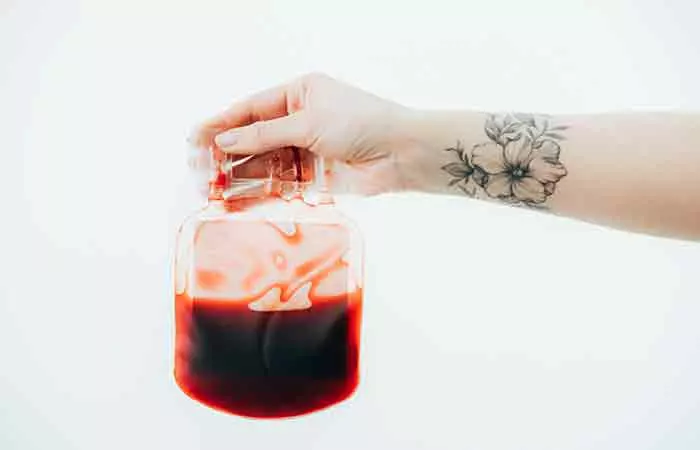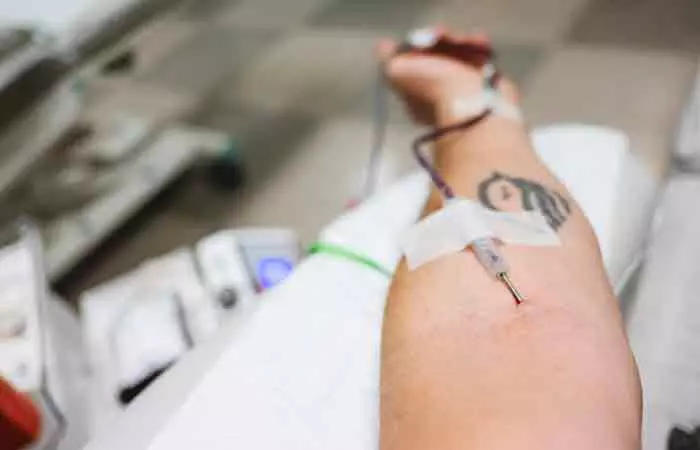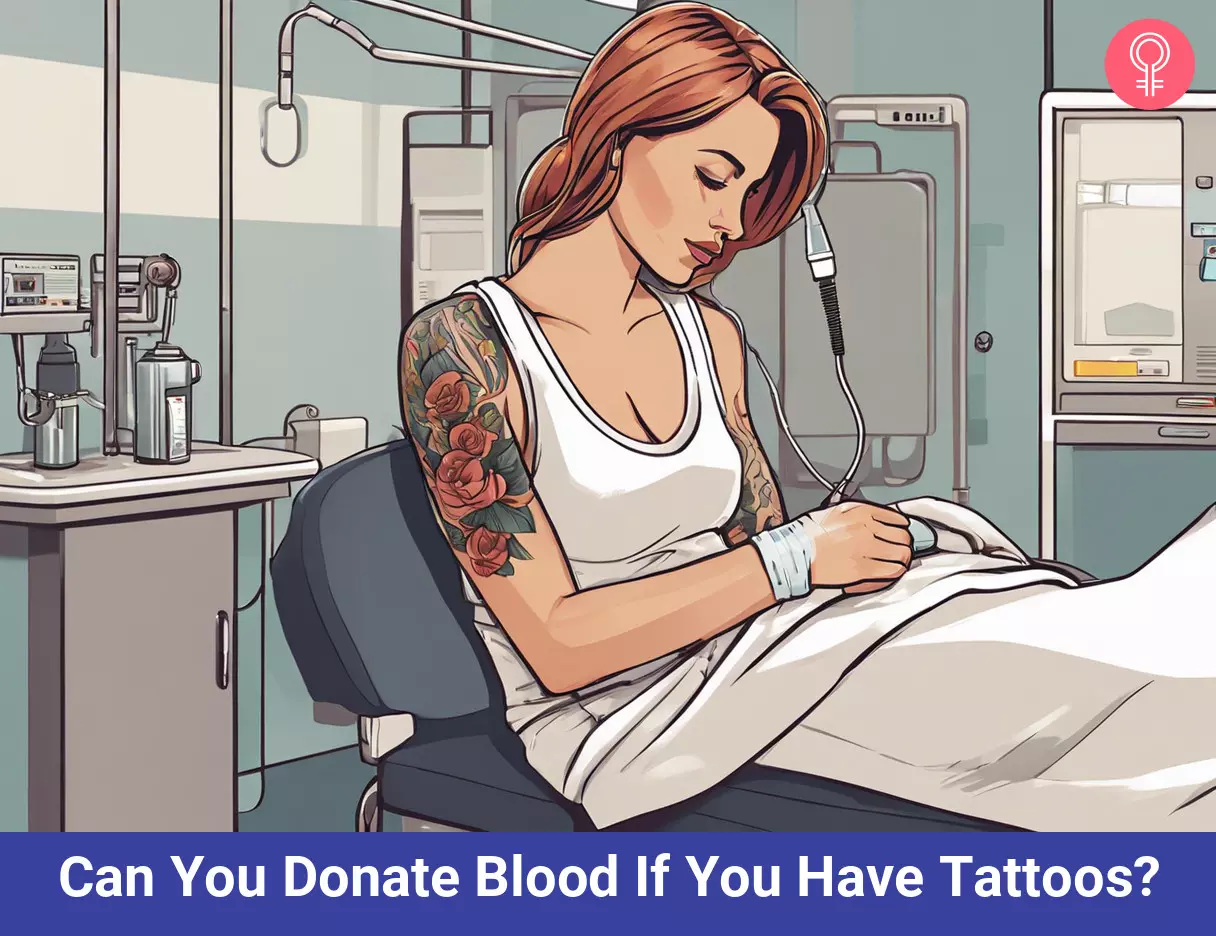
“Can you donate blood if you have tattoos?” is a question that has undoubtedly crossed your mind if you are a tattooed person, as it has become one of those common myths. The process of donating blood involves several considerations. Having tattoos brings up a few additional questions. Understanding whether tattoos affect your ability to donate blood is crucial for those who have body art but also want to become blood donors. In this article, we will dive into the connection between tattoos, blood donation, and why it is important to only visit certified tattoo facilities. Read on to get to the heart of your questions about eligibility.
Can you donate blood if you have tattoos?
 Image: Shutterstock
Image: Shutterstock
Absolutely! Individuals with tattoos can generally donate blood, as a tattoo does not automatically disqualify someone from being a blood donor. Concerns arise primarily from the potential risk of blood-borne infections or blood disorders associated with tattooing, including blood pressure, body temperature, and skin conditions. Blood donation organizations and blood banks are accredited facilities that have strict guidelines in place to maintain health standards and ensure the safety of both anxious blood donors and recipients. It is essential that individuals with tattoos adhere to specific eligibility criteria set forth by blood donation centers, including waiting periods or additional screening measures for medical conditions, blood cells, other blood components, and overall health. By following guidelines, individuals with tattoos can contribute to health care initiatives without compromising safety and support those who may benefit from donating blood.
If you have tattoos, you’ll be happy to know that it doesn’t stop you from becoming a blood donor. But is there a waiting period after getting a tattoo before you can do so? Let’s find out in the next section.
How long after getting a tattoo can you donate blood?
 Image: Shutterstock
Image: Shutterstock
The eligibility to donate blood with a tattoo depends on the recency of your last tattoo. As of 2020, the FDA has mandated a minimum waiting period of three months after getting a tattoo before you can donate blood (1). The waiting period can vary, and it is advisable to check with your local blood donation center for specific guidelines.

Keep the tattoo covered with a clean, sterile bandage for the first few hours after donation to protect it from possible contamination.
Are you wondering why there is a waiting period? The following section will answer your question.
Why can’t you donate blood right after getting a tattoo?
 Image: IStock
Image: IStock
1. Increased risk of infection
Fresh and cosmetic tattoos make the skin vulnerable. They act as open wounds that are susceptible to infectious diseases. Using unclean tattoo needles during tattooing increases the risk factor, as it can potentially introduce bacteria, harmful viruses or other pathogens into the bloodstream. Using a sterile, single-use needle and ink is crucial to ensure a safe and hygienic tattooing experience.
2. Impeded healing
The healing phase of a new tattoo involves the formation of a protective scab over the wounded area. During this crucial time, any disruption of the scab or inadequate care of the fresh ink can increase the risk of viral infections as the skin is still in the process of closing the wound.
3. Infection by blood-borne pathogens
The risk of blood-borne infections and exposure to hepatitis such as hepatitis B and C, as well as HIV, is associated with the potential contamination of blood during the tattoo procedure (2). Despite efforts to maintain hygiene in tattoo parlors, the risk of these serious infections remains a concern.
4. Security Guarantee
Blood donation organizations and blood drives prioritize the safety of both donors and recipients. By implementing a waiting period after tattooing, you are given time to reveal any latent infections you may acquire during tattooing. This ensures that the donated blood contains as few potential contaminants or foreign substances as possible.
5. Regulatory Compliance
Blood donation policies are strict and often regulated by health authorities. Adhering to these regulations is crucial to maintaining the highest safety standards in the blood donation process, as it helps reduce the risk of transmitting infections through donated blood. Understanding the regulations is essential for tattooed individuals considering donating blood.
Should you wait to get a new tattoo after donating blood? Find out in the next section.
How soon after donating blood can you get a tattoo?
 Image: IStock
Image: IStock
It is advisable to wait at least 24 hours after donating blood before getting another tattoo. To be safe, some recommend waiting a week or more. Donating blood can temporarily weaken the immune system and increase the risk of infection, depending on your current health. Doing so at a state-regulated tattoo parlor with a licensed artist can reduce the risk of contracting an infection due to their high standards of hygiene as opposed to an unregulated facility. Always consult with healthcare professionals for personalized advice based on your current health.
A blogger describes a day when he spontaneously decided to donate blood after recently getting a tattoo (actually a piercing). In the blog, he noted, “Since I recently got a tattoo (actually a piercing, wow. I was a little shocked when I wrote that), there is a 4 month buffer period to avoid diseases and shit. I wish I had donated blood beforehand, but that’s okay) (i).” He also shared insights on clinical and deferred donations, discussed the challenges of the process, and expressed his appreciation for the kindness of the nurse.

Just because you have a tattoo doesn’t change the fact that you need to eat iron and potassium rich foods like bananas and eggs to help you recover from the fatigue that can occur after donating blood.
Donating blood if you are a tattooed person is not only possible but encouraged, as tattoos do not automatically disqualify people as potential donors. The most important thing is to adhere to the specific eligibility criteria set forth by blood donation centers and blood drives to ensure the safety of both donors and recipients. While a waiting period of at least three months after tattooing, known as the 3-month deferral rule, is mandated by the FDA, it is crucial to understand the reasons behind this restriction. It is in place to limit the risk of infection, allow for proper healing, and ensure the safety of donated blood by addressing potential bloodborne pathogens. By navigating these considerations and timelines, people with tattoos can actively contribute to lifesaving blood donations.
Frequently Asked Questions
Should tattoos on different parts of the body meet different criteria before someone can donate blood?
In general, tattoos on different parts of the body do not affect the requirements for blood donation. However, regulations may vary; some countries or blood centers may have specific criteria, often related to recent tattoos and possible risk of infection. Check local guidelines for blood donor selection for precise information.
Do temporary tattoos or henna tattoos affect blood donation eligibility?
Temporary tattoos or henna tattoos generally do not affect eligibility for blood donation. However, specific guidelines may vary and it is advisable to check local regulations for accurate information regarding eligibility for donation after receiving such tattoos.
Are the blood donation guidelines for tattoos different for first-time donors and repeat donors?
Rules and guidelines for blood donation and tattoos often apply to both first-time donors and repeat donors. Restrictions are generally based on recent tattoo requests, regardless of the donor’s history.
Can I donate blood if my tattoo is old and completely healed?
Yes, you can donate blood if your tattoo is old and fully healed. There is often a grace period, which usually ranges from a few months to a year after getting a tattoo, even if it has healed. Visit a blood donation center today to check and follow local guidelines for blood donor selection.
Do blood donation guidelines take into account the size and complexity of the tattoo?
Blood donation guidelines typically do not specify the size or complexity of a tattoo. Instead, they often focus on factors such as healing time, blood type, risk of infectious disease, and the safety of the procedure. It is essential to check specific blood donation guidelines and requirements provided by blood donation centers.
Key Points
Having a tattoo does not generally disqualify people from donating blood. Whether you are eligible to donate blood after getting a tattoo depends on the waiting period. The FDA has mandated a minimum waiting period of three months in 2020. The waiting period is in place to reduce the risks of advanced disease, blood infections, bloodborne pathogens, and healing problems, and to ensure the safety of blood in accordance with state regulations. It is recommended to wait at least 24 hours after donating blood before getting another tattoo.
Image: Stable Diffusion/StyleCraze Design Team
In this video, the YouTuber explores the reasons behind the regulations for tattooed individuals before and after they donate blood. Watch the video to gain crucial insights if you are a tattooed individual with similar questions!
Personal experience: Source
References
Articles on StyleCraze are supported by verified information from peer-reviewed and academic research papers, reputable organizations, research institutions, and medical associations to ensure accuracy and relevance. For more information, please read our editorial policy.
Recommendations to reduce the risk of transmission of human immunodeficiency virus via blood and blood productshttps://www.fda.gov/media/92490/download Tattooing and the risk of transfusion-transmitted diseases: the role of tattoo type number and design and the circumstances under which they were appliedhttps://www.ncbi.nlm.nih.gov/pmc/articles/PMC2869796/pdf/11895092.pdfWas this article helpful?
Leave a Reply